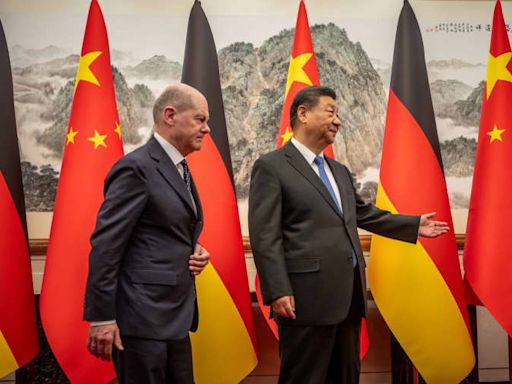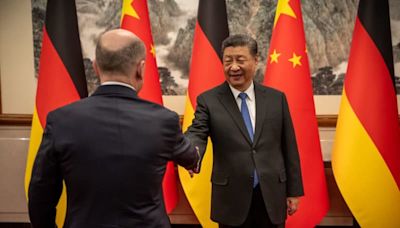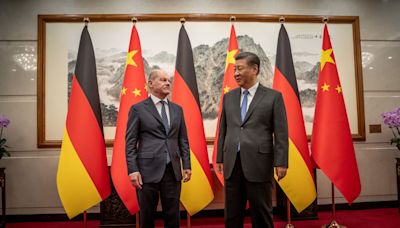Search results
Xi Jinping (Chinese: 习近平; pinyin: Xí Jìnpíng, pronounced [ɕǐ tɕîn.pʰǐŋ]; born 15 June 1953) is a Chinese politician who has been the general secretary of the Chinese Communist Party (CCP) and chairman of the Central Military Commission (CMC), and thus the paramount leader of China, since 2012.
- Overview
- Early life
- Entry into the CCP, education, and marriage
- Ascent in the CCP
- Consolidation of power
Xi Jinping is a politician and government official who became president of China in 2013 and general secretary of the Chinese Communist Party in 2012. He was also vice president of China from 2008 to 2013.
Who is Xi Jinping's father?
Xi Jinping is the son of Xi Zhongxun, who once served as deputy prime minister of China. Xi Zhongxun was often out of favor with his party and government, especially before and during the Cultural Revolution and after he openly criticized the government’s actions during the 1989 Tiananmen Square incident.
Who is Xi Jinping's wife?
Xi Jinping married the popular folksinger Peng Liyuan in 1987.
When did Xi Jinping become the president of China?
Xi Jinping was the son of Xi Zhongxun, who once served as deputy prime minister of China and was an early comrade-in-arms of Mao Zedong. The elder Xi was often out of favor with his party and government, however, especially before and during the Cultural Revolution (1966–76) and after he openly criticized the government’s actions during the 1989 Ti...
In 1974 Xi became an official party member, serving as a branch secretary, and the following year he began attending Beijing’s Tsinghua University, where he studied chemical engineering. After graduating in 1979, he worked for three years as secretary to Geng Biao, who was then the vice premier and minister of national defense in the central Chinese government.
In 1982 Xi gave up that post, choosing instead to leave Beijing and work as a deputy secretary for the CCP in Hebei province. He was based there until 1985, when he was appointed a party committee member and a vice mayor of Xiamen (Amoy) in Fujian province. While living in Fujian, Xi married the well-known folk singer Peng Liyuan in 1987. He continued to work his way upward, and by 1995 he had ascended to the post of deputy provincial party secretary.
In 1999 Xi became acting governor of Fujian, and he became governor the following year. Among his concerns as Fujian’s head were environmental conservation and cooperation with nearby Taiwan. He held both the deputy secretarial and governing posts until 2002, when he was elevated yet again: that year marked his move to Zhejiang province, where he served as acting governor and, from 2003, party secretary. While there he focused on restructuring the province’s industrial infrastructure in order to promote sustainable development.
Xi’s fortunes got another boost in early 2007 when a scandal surrounding the upper leadership of Shanghai led to his taking over as the city’s party secretary. His predecessor in the position was among those who had been tainted by a wide-ranging pension fund scheme. In contrast to his reformist father, Xi had a reputation for prudence and for following the party line, and as Shanghai’s secretary his focus was squarely on promoting stability and rehabilitation of the city’s financial image. He held the position for only a brief period, however, as he was selected in October 2007 as one of the nine members of the standing committee of the CCP’s Political Bureau (Politburo), the highest ruling body in the party.
Are you a student? Get Britannica Premium for only 24.95 - a 67% discount!
Learn More
Among Xi’s first initiatives was a nationwide anti-corruption campaign that soon saw the removal of thousands of high and low officials (both “tigers” and “flies”). Xi also emphasized the importance of the “rule of law,” calling for adherence to the Chinese constitution and greater professionalization of the judiciary as a means of developing “socialism with Chinese characteristics.” Under Xi’s leadership China was increasingly assertive in international affairs, insisting upon its claim of territorial sovereignty over nearly all of the South China Sea despite an adverse ruling by the Permanent Court of Arbitration in The Hague and promoting its “One Belt, One Road” initiative for joint trade, infrastructure, and development projects with East Asian, Central Asian, and European countries.
Xi managed to consolidate power at a rapid pace during his first term as China’s president. The success of his anti-corruption campaign continued, with more than one million corrupt officials being punished by late 2017; the campaign also served to remove many of Xi’s political rivals, further bolstering his efforts to eliminate dissent and strengthen his grip on power. In October 2016 the CCP bestowed upon him the title of “core leader,” which previously had been given only to influential party figures Mao Zedong, Deng Xiaoping, and Jiang Zemin; the title immediately raised his stature. A year later the CCP voted to enshrine Xi’s name and ideology, described as “thought” (“Xi Jinping Thought on Socialism with Chinese Characteristics in a New Era”), in the party’s constitution, an honor previously awarded only to Mao. Xi’s ideology was later enshrined in the country’s constitution by an amendment passed by the National People’s Congress (NPC) in March 2018. During the same legislative session, the NPC also passed other amendments to the constitution, including one that abolished term limits for the country’s president and vice president; this change would allow Xi to remain in office beyond 2023, when he would have been due to step down. The NPC also unanimously elected Xi to a second term as president of the country in March.
Xi’s power and influence were bolstered in 2021 when the CCP passed a historical resolution in November that reviewed the party’s “major achievements and historical experience” of the past 100 years and looked to future plans as well. It featured praise for Xi’s leadership; more than half of the document was devoted to the accomplishments under Xi in the nine years he had led the party, such as reducing poverty and curbing corruption. It was only the third such resolution in the party’s history—the previous two were passed under Mao and Deng—and it elevated Xi’s status, ensuring that he would be seen as a significant figure in the party’s history.
In October 2022 Xi was unanimously elected to a historic third term as general secretary of the CCP, further consolidating his power. On the same day, the party unveiled the 20th Politburo Standing Committee, which, in addition to Xi, consisted of six Xi loyalists. On March 10, 2023, Xi also secured an unprecedented third five-year term as president of China, a development that was widely expected after the Chinese constitution was amended in March 2018 to remove the two-term limit on the presidency. As the only candidate, Xi garnered the votes of all 2,952 delegates to the Congress to remain the head of state.
- Melissa Albert
People also ask
What is the surname Xi Jinping?
Who is Xi Jinping?
How has Xi Jinping changed the world?
Did Xi Jinping destroy China's Freedom?
Mar 9, 2023 · 9 March 2023. By Stephen McDonell & Joel Guinto,in Beijing and Singapore. Getty Images. China's leader Xi Jinping has secured a historic third term as president from the country's rubber-stamp...
Oct 22, 2022 · China’s leader, Xi Jinping, has created a new ruling elite packed with loyalist officials primed to elevate his agenda of bolstering national security and of turning China into a technological...
- 1 min
- Chris Buckley
Oct 23, 2022 · Xi Jinping has a third term as China's leader, in a break with recent precedent; He has also introduced his new top team - which includes former Shanghai party chief Li Qiang as the new premier
Nov 11, 2021 · Published Nov. 11, 2021 Updated March 10, 2022. Share full article. Here’s what we know: Leaders at an elite meeting enshrined Mr. Xi among the party’s historical giants, paving the way for him to...









